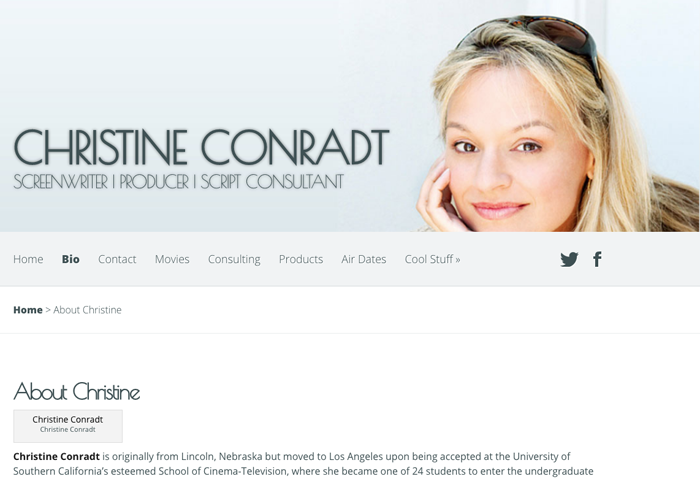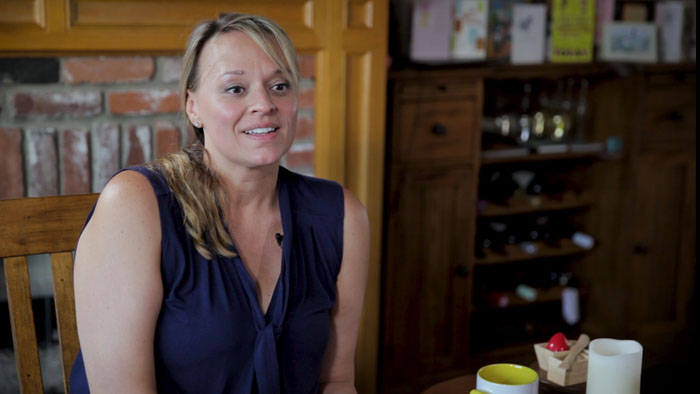
Watch the video interview on Youtube here
Film Courage: I’m wondering if we can start out [this interview] where you were working [before starting as a professional screenwriter], was it at the YWCA?
Christine Conradt: YMCA…
Film Courage: YMCA…okay. And it sounds like you were doing fantastic and they wanted to promote you again. And we can start out on that story because it’s so fascinating?
Christine Conradt: Yes, absolutely. So this is a lot earlier (obviously) in my career. I graduated from film school. I went to USC. I kind of thought (like everybody does) when you graduate from film school that you’re going to graduate with like a three picture deal and that really isn’t how it works. And so while I was in college I had worked as a lifeguard and kind of as an aerobics instructor at a YMCA and they kept promoting me. And someone would quit and they would say “Do you want to learn how to do this job.” And I always said “Yes.”
So eventually I worked my way up to program director and ultimately…Senior Program Director, which is right under the Executive Director. The Executive Director heads up a branch and then there’s a Senior Program Director or two and then all the program directors under that person.
I had been working there and I mean it was fine, it wasn’t what my degree was in. At one point finally I thought well…I had a lot of school debt. Going to USC obviously…I think I was about $60,000 to $70,000 in debt at that point. And my executive director came to me and said “You know, we’d really love to give you your own branch. But we need a five year commitment from you to do that.” And they were going to pay me over $100,000 dollars a year and that would have been great going toward my debt. And so I said “Let me think about that.”
I went home that night and I really thought about what I wanted to do with my life. I had gone to film school and I really hadn’t given it the chance that it deserved. So I thought “Well I’m this much in debt anyway, I’m going to take the chance on being a screenwriter.”
I went back the next day and I thanked the Executive Director for the offer and I said “I can’t accept it, so I have to put my 2-week notice in because I need to take 6 months off and I’m going to take out a loan to live on and I’m going to live my life as a writer. And if it doesn’t work, I can come back and I’ll let go of that dream forever. But if it does work, I owe it to myself to give myself a chance to actually become a screenwriter.”
So I did exactly that. She was not happy that I was leaving [Laughs].

Film Courage: Wow…
Christine Conradt: But I did put my notice in and I did take out the loan to live on. During that time I wrote 2 screenplays. I never sold either of them but they both got me work. And they got me work, and then those got me work, and it actually ended up being really the beginning of my career as a screenwriter.
Film Courage: Wow! So many questions.
Christine Conradt: I know, right?
Film Courage: And there are so many little interesting parts to that [time in your life] and scary parts, too. And I’ve known a few people who have been stuck with the debt [having done] something similar. So I know that is a risk.
Christine Conradt: It’s a huge risk and I would never encourage anyone to emulate that in any way. For me, it worked. And I think because I had already spent the 4 years in school kind of gearing myself up towards this career and I think also I needed that time, it was such a distraction to be working full-time. I needed that time every day to truly be writing. And I spent every moment of that 6 months furthering my career. Going to networking events, watching a different movie every day and breaking it down and doing an outline so I could understand the structure of it, all of those types of things. And actually writing, spending time writing and reading.
For me it worked, but like I said, I’ve known people also where it didn’t work. But if you are going to do something like that, you really have to make use of that time.
It can’t be one of those things where you’re going to figure out what you want to do creatively because I think you just end up treading water in a way. You’ve got to have a plan and you’ve got to execute that plan.
Film Courage: Fascinating. I want to hear more about the 6 months, but just one quick question or two quick questions (actually) and that is did you already know (and forgive me if this is too personal), did you already secure this loan so you knew…or you knew if you could get it?
Christine Conradt: Trust me…when you are $60,000 in debt (let me just explain something to you), you get so many credit card offers that you can pay $20,000, “Here’s an additional $20,000.” They all want you! You are like the best customer ever, right? Because they know you carry debt and I was making the minimum payments. But again, you are going further in debt by doing that. But you are sort of like the golden child for the credit card companies. So I had plenty of offers. I knew I could take out additional loans and lines of credit on my credit card.
Film Courage: Ah, so it wasn’t if, it was which one?
Christine Conradt: Exactly.
Film Courage: Got it. And then my other question is while you were working at the YMCA, were you also writing on the side (aside from having gone to film school)?
Christine Conradt: Yes. I thought I was going to but I think at the level where you become the Senior Program Director, I mean you are working so many hours…and I think I had about 45 people working under me at that time. And so when they don’t show up you have to cover [for them]. So you come home and you’re not in any place to really be creative. So for me (at that time) I found that I wasn’t at that time. I had really just put all the writing on the back burner and that was it. Even on the weekends, I would get a few hours in, but that’s not enough to make a career out of writing.
Question for the Viewers: What thoughts do you have about Christine’s story?

MORE VIDEOS WITH CHRISTINE CONRADT
https://bit.ly/2yyij6j
CONNECT WITH CHRISTINE CONRADT
Christineconradt.com
IMDB
Twitter
Facebook



























